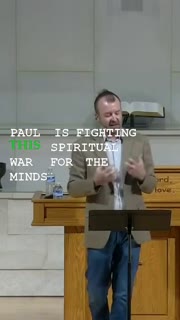Spiritual Warfare: Embracing Divine Power and Humility
Devotional
Sermon Summary
Bible Study Guide
Sermon Clips
### Quotes for outreach
1. "As believers, that's what we are called to do. We're called to mirror Christ in everything that we do, in meekness and gentleness and compassion. Now, Paul's critics, some of the Corinthians, they were accusing Paul of being bold in his letters but timid in person. You know, you're super bold with us when you can hide behind your writings." [47:47] (26 seconds)
2. "Our strength in everything spiritual, our strength in everything that has to do with our spiritual selves doesn't come from our own abilities. It doesn't come from our own personas, who we are and what we do. Everything we do comes from Christ, especially when it comes to spiritual matters, when it comes to preaching sermons. It comes from Christ." [49:21] (27 seconds)
3. "We've got a God who loves us so much who we can come to in prayer. We've got a God who loves us, who gives us power to destroy strongholds. That's a pretty awesome thing. We've got the Word of God. We've got this as our spiritual weapon. Prayer, the Word of God. We've got faith. We've got righteousness. We've got salvation. We've got our brothers and sisters in Christ that are gathered right here, praying for us, supporting us, lifting us up." [51:14] (35 seconds)
4. "We need to boast in the Lord not in what other people think of us. So things like playing music. We were joking about talking this morning about to get and I don't know what it all was but the students were supposed in school the students were supposed to play music and intentionally make seven wrong notes and do that and that's still an A plus right? Is that what it was? You can play this and you get an A plus still and I'm thinking I hit seven wrong notes in one song. Did any of you notice?" [59:27] (40 seconds)
5. "Do you love me? Because I love you don't worry about all that other stuff. I love you. Do you have faith in my son Jesus? God is asking us. That's what matters. Do you have faith? Do you love me? Our boasting needs to be not in ourselves but in the Lord. Paul emphasized that the true measure of our ministry and our lives is not our own evaluations or the opinions of others but what God sees in us." [01:01:33] (40 seconds)
### Quotes for members
1. "Paul is fighting this spiritual war for the minds of the Corinthians, for their hearts, and for their obedience to Christ. And he's not going to stoop down to their blatant self-promotion of these false apostles because, remember, that's what they were, they were falling prey to the pagan influence of those around them." [42:12] (18 seconds)
2. "We don't wage war the way that the world does. The weapons we fight with are not the weapons of the world. Instead, our weapons have this divine power to destroy strongholds. That's huge. Our fight is not against flesh and blood. Our fight is against spiritual forces. They go much deeper, much more severe in many ways, much more serious than flesh and blood, because we've got a spiritual battle going on." [50:32] (39 seconds)
3. "The further we get from hearing the voice of God, the less and less we recognize the voice of God. The further and further away from this we get. The less and less we understand the truths that are found in this book. The further we get away from praying, we don't hear God's voice. Because we're the ones who do all the talking. And we don't just stop and listen for the voice of God." [54:10] (36 seconds)
4. "Paul emphasized that the true measure of our ministry and our lives is not our own evaluations or the opinions of others but what God sees in us. He says let the one who boasts boast in the Lord. That means that finding our identity value and our worth in what God says is more important than any achievement or any approval that we might or might not get from others." [01:02:11] (32 seconds)
5. "We need to take every thought captive. Everything that comes to us, if it's not glorifying God, it's not from God. Take every thought captive. Demolish those strong holds because we have the power to do that. Every thought that we have, we have the power to demolish those strong holds because we have a God who loves us, who hears us, and wants what's best for us." [01:03:16] (23 seconds)
Ask a question about this sermon
1. "As believers, that's what we are called to do. We're called to mirror Christ in everything that we do, in meekness and gentleness and compassion. Now, Paul's critics, some of the Corinthians, they were accusing Paul of being bold in his letters but timid in person. You know, you're super bold with us when you can hide behind your writings." [47:47] (26 seconds)
2. "Our strength in everything spiritual, our strength in everything that has to do with our spiritual selves doesn't come from our own abilities. It doesn't come from our own personas, who we are and what we do. Everything we do comes from Christ, especially when it comes to spiritual matters, when it comes to preaching sermons. It comes from Christ." [49:21] (27 seconds)
3. "We've got a God who loves us so much who we can come to in prayer. We've got a God who loves us, who gives us power to destroy strongholds. That's a pretty awesome thing. We've got the Word of God. We've got this as our spiritual weapon. Prayer, the Word of God. We've got faith. We've got righteousness. We've got salvation. We've got our brothers and sisters in Christ that are gathered right here, praying for us, supporting us, lifting us up." [51:14] (35 seconds)
4. "We need to boast in the Lord not in what other people think of us. So things like playing music. We were joking about talking this morning about to get and I don't know what it all was but the students were supposed in school the students were supposed to play music and intentionally make seven wrong notes and do that and that's still an A plus right? Is that what it was? You can play this and you get an A plus still and I'm thinking I hit seven wrong notes in one song. Did any of you notice?" [59:27] (40 seconds)
5. "Do you love me? Because I love you don't worry about all that other stuff. I love you. Do you have faith in my son Jesus? God is asking us. That's what matters. Do you have faith? Do you love me? Our boasting needs to be not in ourselves but in the Lord. Paul emphasized that the true measure of our ministry and our lives is not our own evaluations or the opinions of others but what God sees in us." [01:01:33] (40 seconds)
### Quotes for members
1. "Paul is fighting this spiritual war for the minds of the Corinthians, for their hearts, and for their obedience to Christ. And he's not going to stoop down to their blatant self-promotion of these false apostles because, remember, that's what they were, they were falling prey to the pagan influence of those around them." [42:12] (18 seconds)
2. "We don't wage war the way that the world does. The weapons we fight with are not the weapons of the world. Instead, our weapons have this divine power to destroy strongholds. That's huge. Our fight is not against flesh and blood. Our fight is against spiritual forces. They go much deeper, much more severe in many ways, much more serious than flesh and blood, because we've got a spiritual battle going on." [50:32] (39 seconds)
3. "The further we get from hearing the voice of God, the less and less we recognize the voice of God. The further and further away from this we get. The less and less we understand the truths that are found in this book. The further we get away from praying, we don't hear God's voice. Because we're the ones who do all the talking. And we don't just stop and listen for the voice of God." [54:10] (36 seconds)
4. "Paul emphasized that the true measure of our ministry and our lives is not our own evaluations or the opinions of others but what God sees in us. He says let the one who boasts boast in the Lord. That means that finding our identity value and our worth in what God says is more important than any achievement or any approval that we might or might not get from others." [01:02:11] (32 seconds)
5. "We need to take every thought captive. Everything that comes to us, if it's not glorifying God, it's not from God. Take every thought captive. Demolish those strong holds because we have the power to do that. Every thought that we have, we have the power to demolish those strong holds because we have a God who loves us, who hears us, and wants what's best for us." [01:03:16] (23 seconds)










